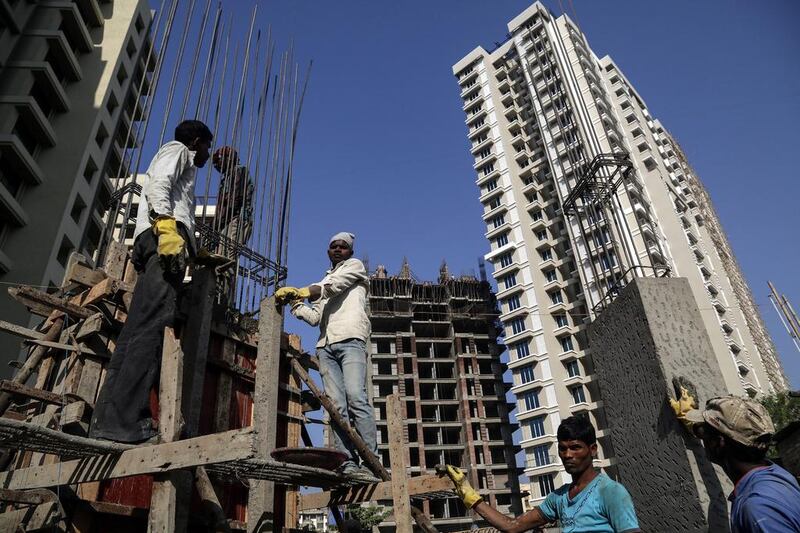India’s property market has long been troubled by unscrupulous developers and weak regulations. So it is no wonder that a new real estate law, which came into effect on May 1, is being closely watched.
The hope is that the Real Estate (Regulation And Development) Act (Rera) will wipe out many fly-by-night developers and give confidence to homebuyers and investors (including those from the UAE), and help revive property sales. And while developers are scrambling to make sure they sure they do not fall foul of the new legislation, the federal initiative faces resistance at the state level.
“We believe that the act will be a game changer for the overall industry, which eventually will transform into growing customer and investor confidence,” says Ashish Puravankara, the managing director of Puravankara Limited, a developer based in Bangalore. “The act promises greater accountability, transparency and efficiency in the sector, as it clearly lays down guidelines for both buyers and developers about their rights and obligations.”
Home sales in India have been characterised in recent years by high prices, which appear to have led to a standoff between developers and homebuyers, and steep interest rates. The industry is also still reeling from the Indian government’s surprise demonetisation move in November, an effort to clamp down on black money. The real estate sector had been a major beneficiary of both legal and illegal cash flows.
The new legislation applies to residential and commercial projects but is expected to have the biggest effect on residential developers.
Anshul Jain, the managing director at consultancy Cushman and Wakefield in India, describes the implementation of Rera as “the single biggest reform which will inspire the much needed trust in time in the sector”.
“The act will bring almost 83,000 registered builders in India under its purview,” he says. “Better regulation and accountability will spur investments from foreign and domestic financial institutions and will bolster longer term potential on real estate investments.”
Under the act, projects and real estate agents have to be registered. Developers can face punishment of imprisonment of up to three years and brokers can be jailed for up to one year for violation of the rules.
Developers will be responsible for paying the interest on bank loans in the instance of construction delays. The new rules state that 70 per cent of the money collected from customers has to be deposited in a separate bank account. Homebuyers can face penalties for delays in payments.
Companies are making significant efforts and investing to make sure that they comply with the new rules.
“Many developers have started to re-design their business practices and processes to suit the regulations perfectly,” says Rahul Shah, the chief executive of Sumer Group, a Mumbai builder.
Some builders say companies should be granted a bit of flexibility as the transition takes place.
“Developers should be given more time for the administrative work of the projects,” says Manju Yagnik, the vice chair of Nahar Group in Mumbai. She said the July 31 deadline for registration of all property projects with the regulators “looks challenging as not just developers but also respective authorities will require some time to get their paperwork done”.
Samir Jasuja, the chief executive of the research house PropEquity, says that “with implementation of Rera, we foresee delays in project deliveries to go down as developers rush to complete previously launched projects to avoid penalties” for late delivery.
Experts say that costs are set to rise for developers, including foreign developers, as they comply with the rules. This includes registration and compliance costs.
Bhavin Gada, an associate partner at Economic Laws Practice, a law firm in Mumbai, says the law will be to the advantage of UAE developers investing in India.
“In our view the act would encourage more UAE and Gulf developers to build projects in India because the majority of such developers enter into a joint venture with domestic developers for projects in India,” says Mr Gada. “Since the real estate projects would now be regularised and monitored by Rera, it would act as an additional comfort for the UAE and Gulf developers. It is also pertinent to note that the laws pertaining to real estate sector in the UAE and Gulf region are stringent. As such, developers from the UAE and Gulf are accustomed to such stringent compliances.”
Property brokers will also be held to account under Rera.
“The survival of broking firms will depend on how they inculcate a corporate culture,” says Shishir Baijal, the chairman and managing director of Knight Frank India. “From being merely a facilitator between buyers and sellers, brokers will now have to adopt a bigger advisory role attached with responsibility for projects and disclosures. Although there would be teething problems the move will lead to the emergence of a new consolidated broking fraternity.”
At a broader level, not everything has gone smoothly so far when it comes to the implementation of the act in India. Only about half of the states across India had got themselves ready for the launch of the new act on Monday. These include Kerala, Maharashtra, Uttar Pradesh and Rajasthan.
“Despite continuous monitoring and follow up by the ministry of urban development and housing, government of India, only nine states and six union territories” were prepared, while others missed the deadline for implementing the rules, according to Crisil, the Indian ratings and research company that is part of Standard & Poor’s.
Under Rera, every state has to set up its own regulatory authority.
Crisil says it conducted a comparison of “state specific rules with the central act and found that many states have either diluted a few crucial aspects of the act or given insufficient emphasis to its provisions in their rules”.
business@thenational.ae
Follow The National's Business section on Twitter






